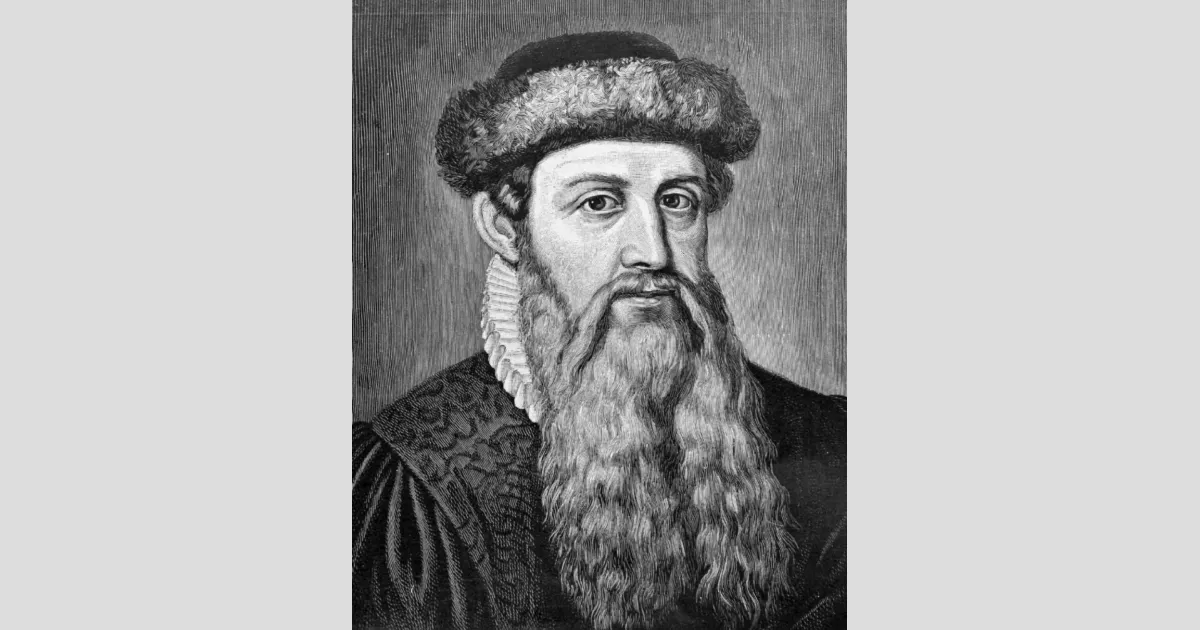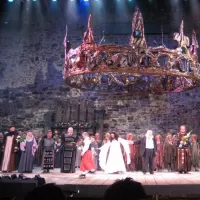Johannes Gutenberg, a German inventor, revolutionized printing with his invention of the movable-type printing press. While movable type existed in East Asia, Gutenberg's press enabled faster printing, leading to widespread information dissemination across Europe. This invention significantly influenced the Renaissance, Reformation, and humanist movements.
1900: 500th Anniversary of Gutenberg's Birth
The Gutenberg Museum was founded in Mainz, Germany, in 1900 to celebrate the 500th anniversary of Johannes Gutenberg's birth.
1952: Commemorative Stamp for Gutenberg's Invention
The United States Postal Service issued a stamp in 1952 to commemorate the 500th anniversary of Johannes Gutenberg's invention of the movable-type printing press.
1968: Mainz Johannisnacht Commemorates Gutenberg
Since 1968, the Mainz Johannisnacht (St. John's Night) has been celebrated in Gutenberg's hometown, serving as a tribute to his legacy and contributions.
1978: Gutenberg Ranked 8th Most Influential Person in History
Michael H. Hart, in his 1978 book "The 100: A Ranking of the Most Influential Persons in History," placed Gutenberg as the 8th most influential figure, acknowledging his significant contributions to human civilization.
1997: Gutenberg's Invention: Most Important of the Second Millennium
In 1997, Time Life magazine recognized the significance of Gutenberg's invention, naming it the most important of the second millennium.
1999: Gutenberg: "Man of the Millennium"
In 1999, Gutenberg's influence on history was widely recognized. He was voted "man of the millennium" by US journalists and ranked as the most influential person of the second millennium by the A&E Network.
2001: Digital Analysis of Gutenberg's Printing
In 2001, Blaise Agüera y Arcas and Paul Needham conducted a digital analysis of Gutenberg's printing using a Papal bull. Their findings suggested that Gutenberg did not use traditional punchcutting techniques, further supporting claims about his innovative printing methods.
2001: Opera about Gutenberg Premieres
The opera "G, Being the Confession and Last Testament of Johannes Gensfleisch, also known as Gutenberg, Master Printer, formerly of Strasbourg and Mainz," composed by Gavin Bryars, premiered in 2001.
2004: Nash's Theory on Gutenberg's Printing Method
In 2004, Nash proposed a theory suggesting that Gutenberg might have used individually carved wooden types for printing instead of reusable matrices. This theory aligned with earlier suggestions made by Fournier Le Jeune in the 19th century.
2011: Premiere of "La Nuit de Gutenberg"
The opera "La Nuit de Gutenberg," composed by Philippe Manoury, premiered in Strasbourg in 2011, paying homage to Gutenberg's life and work.
Trending

2 months ago LoL Worlds 2025: T1 vs Gen.G Final Forecasted to Break Viewership Records

1 month ago Sadie Sink avoids Spider-Man spoilers, shows abs. Holland's mistakes provide lessons.

22 days ago Salma Hayek stuns in velvet dresses showcasing Old Hollywood glamour and Kahlua partnership.
4 months ago Uber faces scrutiny over safety record and sexual assault allegations, raising concerns.
1 month ago Dylan O'Brien Stars in Sam Raimi's Outrageous Horror Comeback, 'Send Help'

1 month ago Ubisoft's Anno 117 includes AI art placeholder; Fans react negatively.
Popular

Candace Owens is an American conservative political commentator and author...

Tucker Carlson is an American conservative political commentator known for...

XXXTentacion born Jahseh Dwayne Ricardo Onfroy was a controversial yet...

Ilhan Omar is an American politician currently serving as the...

Kashyap Pramod Patel is an American lawyer who became the...

Bill Gates an American businessman and philanthropist revolutionized personal computing...


